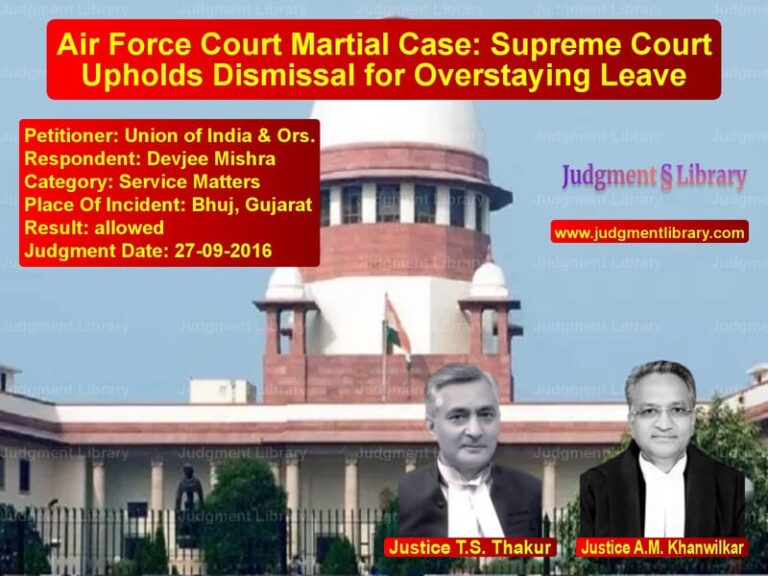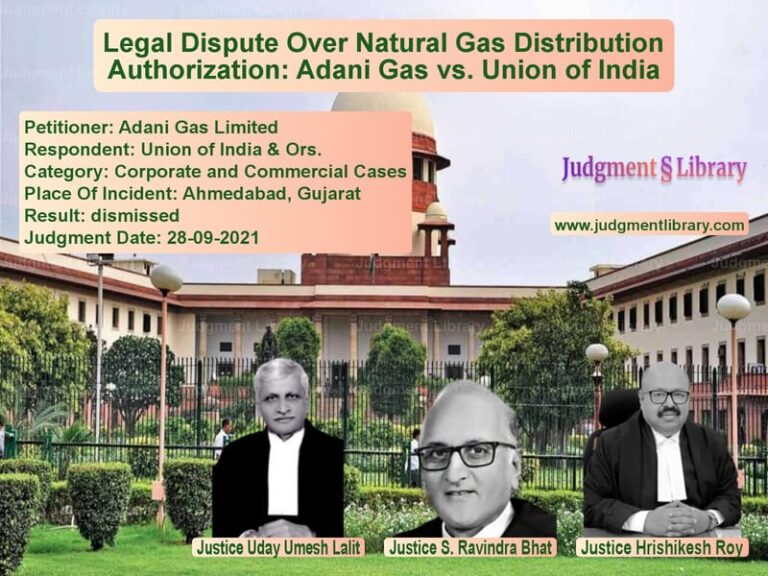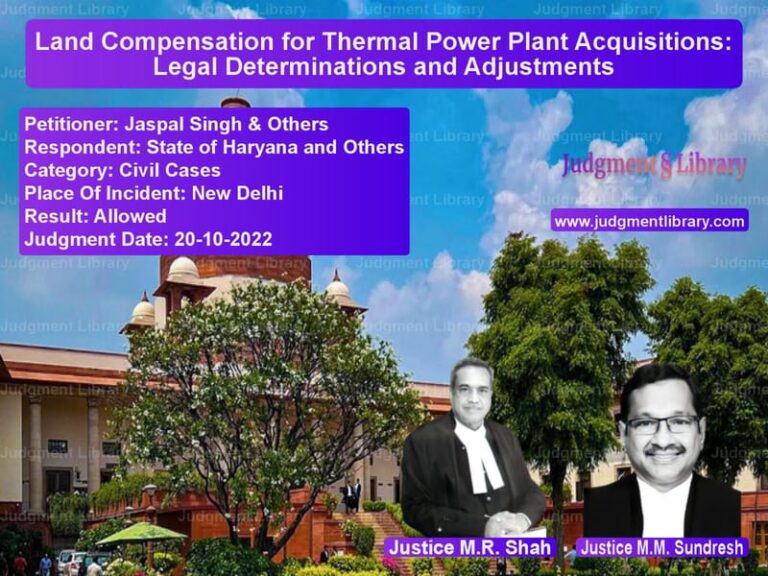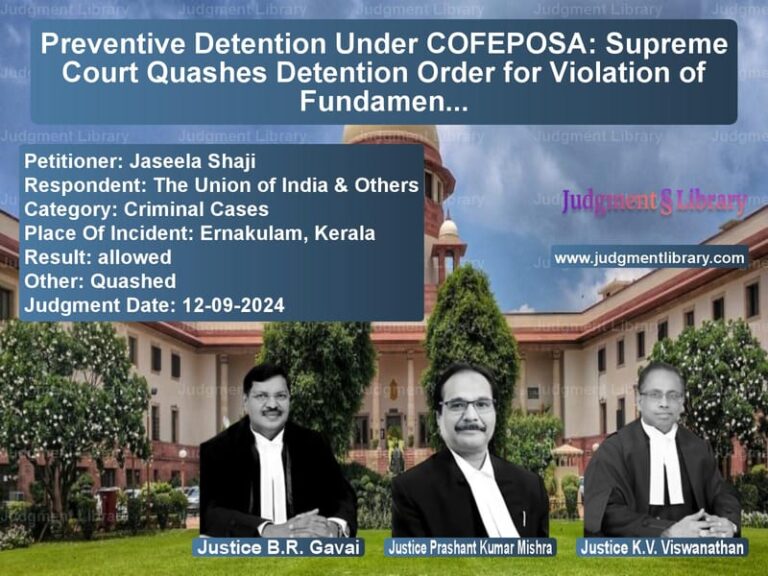Land Dispute Turns Fatal: Supreme Court Modifies Conviction in Chhattisgarh Murder Case
The case of Devendra Kumar & Ors. vs. State of Chhattisgarh is a significant criminal appeal concerning a long-standing land dispute that escalated into a fatal assault. This case raises crucial legal questions about premeditation in homicide, the distinction between murder and culpable homicide, and the impact of sudden provocation on criminal liability.
Initially, the trial court convicted the appellants under Section 302 IPC for the murder of Bahal and sentenced them to life imprisonment. The High Court upheld this conviction. However, upon further appeal, the Supreme Court re-evaluated the evidence and modified the conviction to Part I of Section 304 IPC, reducing the sentence to time already served.
Background of the Case
The incident took place on December 20, 2002, in Village Chhirha, Chhattisgarh. The appellants and the deceased had a long-standing dispute over agricultural land. This dispute had already been subject to legal proceedings, and the Sub-Divisional Magistrate had issued an order maintaining the status quo just days before the incident.
On the day of the incident, the deceased, Bahal, accompanied by his mother, Rajni Bai (PW-1), visited Village Chhirha. While discussing the case with the village Sarpanch, Ghurwaram Patel (PW-4), the appellants arrived, armed with sticks, a rod, and an axe. A quarrel ensued, leading to a physical assault on the deceased and his mother. The deceased succumbed to his injuries the same day, with the post-mortem confirming that the cause of death was coma due to a severe head injury.
Trial Court Proceedings
The trial court framed charges under Section 302 read with Section 34 IPC and, alternatively, under Section 307 read with Section 34 IPC. The prosecution examined 15 witnesses, including key eyewitnesses Rajni Bai (PW-1), Dhannu Das (PW-2), Pusau (PW-3), and Ghurwaram Patel (PW-4). Based on their testimonies and medical evidence, the trial court convicted the appellants for murder and sentenced them to life imprisonment.
High Court’s Affirmation
On appeal, the High Court upheld the trial court’s findings, stating that the prosecution had successfully proven its case. The court emphasized that the appellants had attacked the deceased with deadly weapons, leading to his death. As a result, the conviction under Section 302 IPC was affirmed.
Arguments Before the Supreme Court
Appellants’ Arguments
- The appellants were falsely implicated due to the ongoing land dispute.
- The deceased had previously attempted to dispossess them from their land.
- The incident was not premeditated but occurred in the heat of the moment during a sudden quarrel.
- The offense should be considered under Section 304 IPC rather than Section 302 IPC.
State’s Arguments
- The appellants were armed and had issued threats before attacking the deceased.
- The prosecution’s case was supported by direct eyewitness testimony.
- Both the trial court and High Court had correctly convicted the appellants under Section 302 IPC.
Supreme Court’s Analysis
The Supreme Court examined the following key legal aspects:
1. Whether the killing was premeditated
The Court noted that the appellants and the deceased had a history of enmity. However, there was no evidence of prior planning or conspiracy to commit the murder. The altercation appeared to have arisen suddenly when the deceased showed legal documents to the village Sarpanch.
2. Nature of the attack
The attack involved the use of an axe, sticks, and a rod—common agricultural tools. While these were lethal weapons, their usage did not necessarily indicate an intent to kill with premeditation.
3. Legal distinction between murder and culpable homicide
The Court applied the test laid down in previous judgments to distinguish between murder and culpable homicide. It concluded that the case fell under Part I of Section 304 IPC, which applies when death is caused in a sudden fight without premeditation but with knowledge that the act was likely to result in death.
Supreme Court’s Judgment
The Supreme Court ruled:
- The conviction under Section 302 IPC was modified to Section 304 Part I IPC.
- The sentence was reduced to time already served (over 12 years).
- The appellants were ordered to be released immediately.
The judgment states:
“Taking into consideration all these aspects, the possibility of offense being committed by the appellants without premeditation in a sudden fight in a heat of passion upon a sudden quarrel cannot be ruled out. From the nature of the injuries sustained by the deceased, it cannot be said that the appellants have taken undue advantage or acted in a cruel or unusual manner.”
Conclusion
This case underscores the importance of distinguishing between premeditated murder and culpable homicide. The Supreme Court’s ruling reinforces that not all killings amount to murder under Section 302 IPC. When a death occurs in the heat of passion during a sudden fight, courts must carefully assess the circumstances before determining the appropriate legal classification.
The ruling also highlights the role of land disputes in escalating conflicts. Legal mechanisms exist to resolve such disputes peacefully, but when individuals take matters into their own hands, the consequences can be severe. This judgment serves as a precedent in analyzing similar cases where land disputes lead to violent confrontations.
Petitioner Name: Devendra Kumar & Ors..Respondent Name: State of Chhattisgarh.Judgment By: Justice B.R. Gavai, Justice Prashant Kumar Mishra, Justice K.V. Viswanathan.Place Of Incident: Village Chhirha, Chhattisgarh.Judgment Date: 06-11-2024.
Don’t miss out on the full details! Download the complete judgment in PDF format below and gain valuable insights instantly!
Download Judgment: devendra-kumar-&-ors-vs-state-of-chhattisgar-supreme-court-of-india-judgment-dated-06-11-2024.pdf
Directly Download Judgment: Directly download this Judgment
See all petitions in Murder Cases
See all petitions in Attempt to Murder Cases
See all petitions in Bail and Anticipatory Bail
See all petitions in Judgment by B R Gavai
See all petitions in Judgment by Prashant Kumar Mishra
See all petitions in Judgment by K.V. Viswanathan
See all petitions in partially allowed
See all petitions in Modified
See all petitions in supreme court of India judgments November 2024
See all petitions in 2024 judgments
See all posts in Criminal Cases Category
See all allowed petitions in Criminal Cases Category
See all Dismissed petitions in Criminal Cases Category
See all partially allowed petitions in Criminal Cases Category







